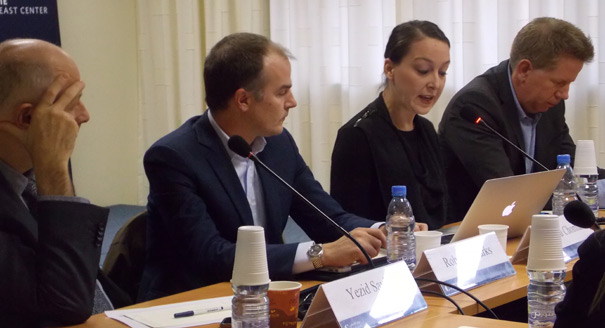{
"authors": [
"Laryssa Chomiak",
"Robert Parks",
"Yezid Sayigh",
"Frederic Wehrey"
],
"type": "event",
"centerAffiliationAll": "",
"centers": [
"Carnegie Endowment for International Peace",
"Malcolm H. Kerr Carnegie Middle East Center"
],
"collections": [
"Arab Awakening"
],
"englishNewsletterAll": "",
"nonEnglishNewsletterAll": "",
"primaryCenter": "Malcolm H. Kerr Carnegie Middle East Center",
"programAffiliation": "",
"programs": [],
"projects": [],
"regions": [
"North Africa",
"Libya",
"Algeria",
"Tunisia",
"Maghreb"
],
"topics": [
"Political Reform",
"Security",
"Democracy"
]
}
Transitions and Security in North Africa: External and Internal Factors
Thu, January 29th, 2015
Beirut
Four years after efforts to topple authoritarian regimes in North Africa, the road to democratic governance is still incomplete. The Carnegie Middle East Center hosted Laryssa Chomiak and Robert Parks to examine the political landscape and address the security challenges that lie ahead in Tunisia and Algeria. Frederic Wehrey assessed the transitional process and what a resolution could look like in Libya. Carnegie’s Yezid Sayigh moderated.
DISCUSSION HIGHLIGHTS
- Tunisia: Four years after the Tunisian revolution, the country has prepared for two elections in four years. Many would argue that Tunisia is on the correct path to democracy, said Chomiak. However, a more in-depth analysis shows that Tunisia still lacks meaningful judiciary reforms and suffers from security and economic concerns, argued Chomiak.
- Algeria: Algeria has gone from being a regional exporter of instability to a key player in stabilizing the region, said Parks. However, in the wake of the French-led NATO intervention into Mali and Libya, stateless territories have begun to emerge. These areas allow groups to accumulate strength and wealth and become credible rivals of official authorities in these countries, explained Parks. Furthermore, there is a great deal of discussion and growing disagreements between northern versus southern Algeria. Today, the lowering prices of oil could force Algeria to dip into its foreign reserve and review some of its expenditures, which could challenge the regime and geographically divide citizens, said Parks.
- Libya: The Libyan war has been four times as deadly as the conflict in Yemen, stated Wehrey. The violence in Libya is a result of the Qaddafilegacy, which prevented the formation of civil societies or any participatory institutions. Thus, the core of Libya’s struggle has been in the reconstruction of the security institutions, Wehrey explained. Moreover, due to the inability of the weak post-revolution regime to police territory, it has subsidized militias and placed them under the control of the government. Wehrey concluded that knowing about these security limitations is crucial to understanding the widespread violence in Libya.
Laryssa Chomiak
Laryssa Chomiak is the director of the Centre d'Etudes Maghrébines à Tunis.
Robert Parks
Robert Parks is the founding director of the Centre d'Études Maghrébines en Algérie.
Yezid Sayigh
Yezid Sayigh is a senior associate at the Carnegie Middle East Center in Beirut, where his work focuses on the Syrian crisis, the political role of Arab armies, security sector transformation in Arab transitions, the reinvention of authoritarianism, and the Israeli-Palestinian conflict and peace process.
Frederic Wehrey
Frederic Wehrey is a senior associate in the Middle East Program at the Carnegie Endowment for International Peace. He focuses on Gulf political and security affairs, Libya, and U.S. policy in the Middle East.
Carnegie does not take institutional positions on public policy issues; the views represented herein are those of the author(s) and do not necessarily reflect the views of Carnegie, its staff, or its trustees.
Event Speakers
Laryssa Chomiak
Robert Parks
Yezid Sayigh is a senior fellow at the Malcolm H. Kerr Carnegie Middle East Center in Beirut, where he leads the program on Civil-Military Relations in Arab States (CMRAS). His work focuses on the comparative political and economic roles of Arab armed forces, the impact of war on states and societies, the politics of postconflict reconstruction and security sector transformation in Arab transitions, and authoritarian resurgence.

